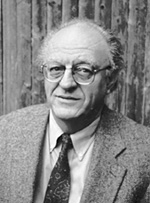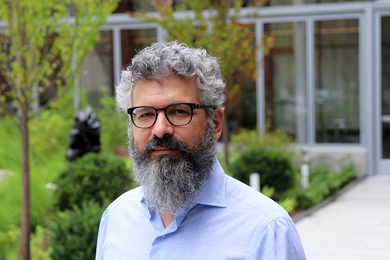Boyce Rensberger of The Washington Post has been named Director of the Knight Science Journalism Fellowships at the Massachusetts Institute of Technology, effective July 1, Dean Philip S. Khoury of the MIT School of Humanities and Social Science announced.
A winner of the Alicia Patterson Fellowship and a two-time winner of the AAAS science journalism award, Rensberger has been a science reporter for the Detroit Free Press, The New York Times, and The Post, where he served as science editor. He also was head writer for the public television series, "3-2-1 Contact," and a senior editor of the monthly magazine Science 81-84.
For the last seven years, he has been co-director of the Science Writing Fellowships Program each summer at the Marine Biological Laboratory in Woods Hole, Massachusetts. He created in 1994 and is editor of "Horizon: The Learning Section," a monthly supplement to The Washington Post.
"I think people enjoy being fascinated as much as they enjoy being amused," Rensberger says. "An important step toward creating a sense of fascination is that people learn new information. Thus, science writing that enterains people by fascinating them also educates them."
Mr. Rensberger, 55, received his BS in zoology and journalism at the University of Miami in Florida and a masters degree in journalism and mental health information from Syracuse University. He has been a guest lecturer on science writing at Johns Hopkins University and the University of Maryland.
Rensberger has written four books, The Cult of the Wild, 1977; How the World Works: A Guide to Science's Great Discoveries, 1986; Instant Biology, 1996; and, in 1997, Life Itself: Exploring the Realm of the Living Cell, published by Oxford University Press.
He will succeed Victor K. McElheny, the founding Director of the Knight Fellowships, who is retiring. Mr. McElheny started the mid-career program for science journalists at MIT in 1982, capping a career as a science journalist with the Charlotte Observer, Science magazine, the Boston Globe and the New York Times. He was director of the Banbury Center at Cold Spring Harbor Laboratory before coming to MIT. Mr. McElheny, 62, will continue to be associated with the Program in Science, Technology, and Society (STS). His biography of Edwin H. Land is scheduled for fall publication by Addison-Wesley.
Dean Khoury commented, "Boyce Rensberger brings to MIT and the Knight Science Journalism Fellowships enormous talent and experience as one of America's most distinguished science journalists. He has demonstrated innovative leadership at the Washington Post, where he established the much lauded Horizon Section, and at the Marine Biological Laboratory's summer mid-career science journalism program which he has co-directed for many years. I am convinced he will take the Knight program to the next level and beyond.
"Boyce has big shoes to fill in replacing Victor McElheny, who founded the program at MIT and has been its stalwart leader for 16 years," Professor Khoury said. "Victor raised the generous gifts of $8 million from the Knight Foundation. The Foundation's late chairman, James L. Knight, said the gift to MIT 'reflects our conviction that better-educated journalists are essential to public understanding of the complexities of modern science and technology.'
"The Knight Foundation support began in 1987 with a $3.25 million grant for seven years' operations, followed by a five-year, $5 million challenge calling for $2.5 million in matching funds from MIT. The Knight gift is one of the largest and most important endowments to come into the School of Humanities and Social Science in the past 20 years," Dean Khoury said.
Philip Sharp, Nobel Laureate and head of the Department of Biology, commented, "I have always considered it very important that the Knight Science Journalism Fellowships program has brought highly visible professionals to campus who write about science and its impact on society, and has allowed them to learn from the MIT community about the forefront of science in a host of areas. I think the program has been highly professional and quite an exciting addition to the MIT campus."
Serving with Dean Khoury on the search committee were Professor Michael Fischer, Director of the STS program; Associate Professor Deborah Fitzgerald of STS; Alan Lightman, Burchard Professor of Science and Writing, and Professor Robert Weinberg of the Biology Department and Member, Whitehead Institute.
Since their start in 1983 with support from the Alfred P. Sloan and Andrew W. Mellon Foundations, the Fellowships have brought a total of 154 science journalists, 70 women and 84 men, from around the world for nine months of study at MIT. Non-U.S. Fellows have numbered 41. The Fellows, currently six Americans and a varying number of international journalists each year, work for newspapers, magazines, wire services, radio, and television.
The fifteenth class of Fellows arrived at MIT last September. Scores of MIT faculty lecture in the program's twice-weekly seminars, and welcome Fellows to courses and laboratories. The seminars concern current developments in science and technology and their societal implications.
At the recent Philadelphia meeting of the American Association for the Advancement of Science (AAAS), two former Knight Fellows received awards. Jenni Laidman (1995-96) of the Bay City Times in Michigan received the AAAS science journalism award in the small-newspaper category for her series: "Unnatural Resources: Playing God in the Great Lakes." Peggy Girshman (1991-92) of National Public Radio, shared in the AAAS radio award for the series, "How the Brain Works."






